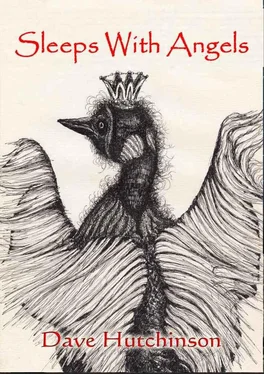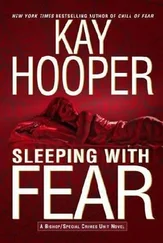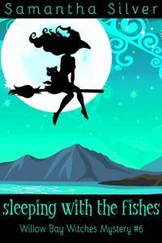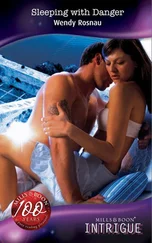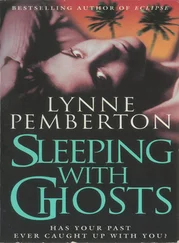Eventually, I came across a room. Although this wasn’t a room in the sense that anyone here would recognise. It was all distributed planes of stress and knots of mass, open on all sides, too huge to measure. I stepped into the room and sat down in a comfortable chair.
Nobody screamed. Nobody ran away. They were expecting me, of course, and I had learned long ago how to clothe myself before I came here . People hate it when naked men appear out of nowhere in the Situation Room at the White House. Someone brought me coffee. The coffee here was always excellent.
“Mr Dolan,” said the President.
“Madam President,” I said. I sipped my coffee. “He’s recovering more quickly.”
“We noticed,” said one of the scientists, a man named Sierpiński. “The others?”
“I saw some of them. They’re still aestivating. I’m not sure I should be checking them out; won’t observing them collapse them into one state or the other?”
Sierpiński shrugged. We don’t know . Maybe we should make that our Company Song.
“You look tired,” said the President.
“I look how I want to look,” I snapped, and regretted it. She was not an unkind person, and I was tired. And anyway, it was ridiculous. Why would a godlike transdimensional superhero want to look like a tubby balding middle-aged man? If I wanted, I could look like Lady Gaga or Robert Downey, Jr., or an enormous crystal eagle, but what I really want is to be ordinary again, and that, of all things, I cannot do.
I looked up at the expectant faces, all of them waiting to hear how I had saved the world again.
“Do you think I could have a sandwich?” I asked.
v
Ah, ‘Exploding Man.’ This one was fun. A few years ago I did an online writing course run by my friend Jeremy C Shipp, who writes extremely accomplished bizarro fiction. It was a great experience, and one of the exercises was to write a short story for critiquing by the rest of the group, then rewrite it and have it critiqued again. So I wrote this. I have no idea where the idea came from, or the characters; I just sat down and wrote it.
The first draft was dreadful, it took its lumps in the first critiquing, and I went away and instead of tweaking it I more or less took it apart and rewrote it completely over the course of a few days, and it was better-received the second time round.
Some time later, the sainted Ian Whates was putting together his first Solaris Rising anthology, and asked me if I had anything I could submit, so I sent him what was, at the time, called “The Return of the Incredible Exploding Man.” Ian liked the story, which made it into the book, but Peter Hamilton already had a piece in there with “The Return of…” in the title, so that had to go.
Some time after that, there was a signing of the book at Forbidden Planet, which I kind of gate-crashed — I love signing books; I’d sign other people’s if I was asked — and at that I met mighty Solaris editor Ben Smith, who asked me if I was working on anything else, and I mentioned I’d been working on a novel for some time.
About a year later, Ben got back in touch. ‘Just wondering if you’d finished that novel you told me about…’
And, long story short, that’s how Europe In Autumn came to be published. Just goes to show, you never can tell.
Dave Hutchinson was born in Sheffield in 1960. After reading American Studies at the University of Nottingham, he moved into journalism. He is the author of five collections of short stories, most recently As the Crow Flies (Bewrite, 2004), the novels The Villages (Cosmos Books, 2001) and Europe in Autumn (Solaris, 2014), and the novella The Push (NewCon Press, 2009). Both The Push and Europe in Autumn have been shortlisted for BSFA awards. His next novel, Community , which is a spin-off from Europe in Autumn though not a direct sequel, is due from Solaris in 2016. Dave currently lives in London.
